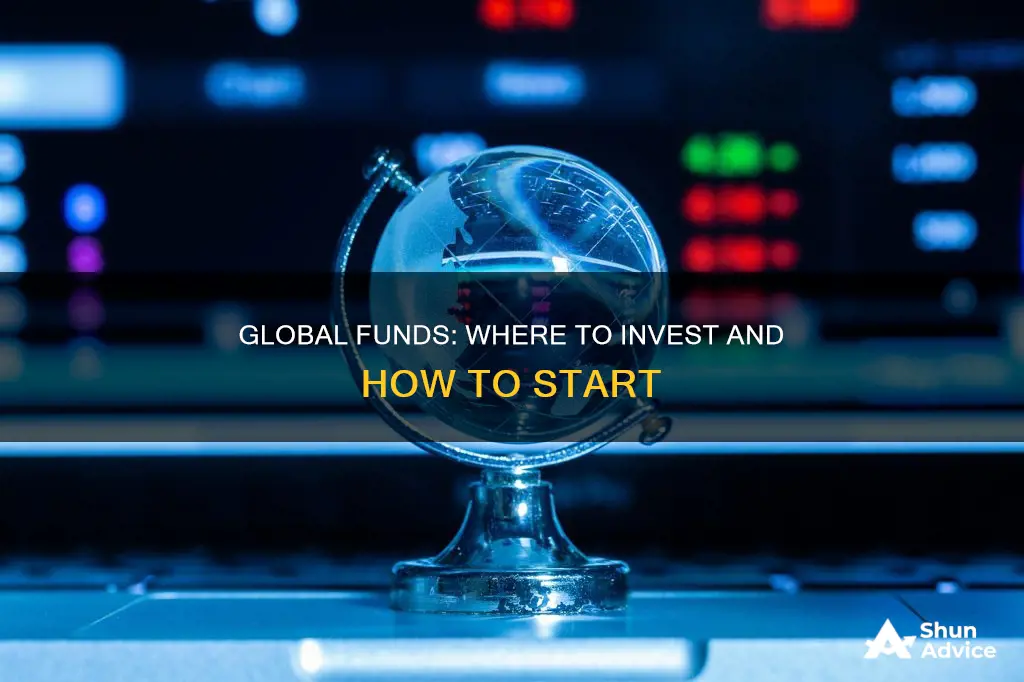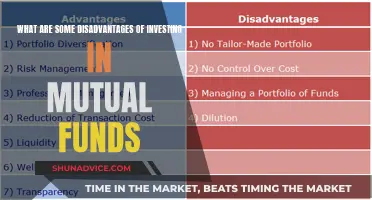
Global funds are a type of investment tool that allows investors to put their money into companies and enterprises located anywhere in the world, including their own country. They are often confused with international funds, which only invest in foreign markets and exclude the investor's home market. Global funds are a great way to diversify one's portfolio, providing exposure to a wide range of companies and markets, and offering the potential for high profits. However, it's important to note that investing in global funds also comes with risks, such as currency fluctuations and geopolitical factors. Before investing, it's crucial to understand the types of investments these funds contain and perform due diligence on the associated risks.
| Characteristics | Values |
|---|---|
| Definition | Global funds consist of securities in all parts of the world, including the investor's home country. |
| --- | --- |
| Who is it for? | Investors who wish to diversify against country-specific risk without excluding their own country. |
| --- | --- |
| Types | Actively managed funds and passively managed funds. |
| --- | --- |
| Risk | The risk depends on country-specific policies and market conditions. Fluctuations in the value of an international currency can also have an impact. |
| --- | --- |
| Returns | Returns offered by a Global Mutual Fund could vary, owing to multiple parameters like currency exchange, global politics, etc. |
| --- | --- |
| Time period | The time period for investing in Global Mutual Funds is typically more, hence making it a suitable candidate for long-term investments. |
| --- | --- |
| Taxation | All international funds are taxed as if they were non-equity funds. Gains from international funds are taxed at the marginal rate if they are sold within three years from the date of purchase. |
What You'll Learn

Global funds vs international funds
Global funds and international funds are two distinct types of funds with different investment goals and opportunities. Understanding the differences between these two types of funds is crucial for investors looking to diversify their portfolios and gain exposure to companies located outside their home country.
Global funds consist of securities from all parts of the world, including the investor's home country. Investors who choose global funds are typically seeking to diversify their portfolios and protect themselves against country-specific risks without excluding domestic investments. The mix of domestic and foreign investments in global funds can provide a hedge against country-specific risks, as a downturn in one country's market may be offset by positive performance in other markets. However, it is important to note that global funds may also duplicate investments already held by the investor in their home country.
On the other hand, international funds consist of securities from all countries except the investor's home country. These funds provide a way for investors to diversify their portfolios by gaining exposure to foreign markets without overlapping with their domestic investments. International funds can invest in a variety of markets, from solid markets in developed countries to emerging markets that carry more risk but may offer higher returns. It is important to note that "international" does not necessarily mean the fund invests in every country except the investor's home country; many international funds specialise in specific regions.
One key difference between global and international funds is their approach to currency risk. Global funds, by including the investor's home country, provide some protection against currency fluctuations, as investments in the home country's currency are not subject to exchange rate risk. International funds, on the other hand, are fully exposed to currency risk, as all investments are made in foreign currencies.
Another important distinction is the level of control and knowledge an investor has over their portfolio. With global funds, investors may not know their exact exposure to their home market at a given time, as the fund manager has the latitude to shift investments between domestic and foreign markets. International funds, on the other hand, allow investors to maintain greater control over their asset allocation and adhere to their desired domestic-to-international stock ratio.
In summary, global funds offer investors a way to diversify their portfolios while maintaining some exposure to their home country, while international funds provide a means to diversify solely into foreign markets. The choice between the two depends on the investor's existing portfolio, risk tolerance, and investment goals.
Selling Investment Funds: Knowing When to Let Go
You may want to see also

Tax implications
When investing in global funds, it is important to be aware of the potential tax implications, as these can vary depending on the type of account and location of the investor. Here is an overview of some key tax considerations:
- Taxable Brokerage Account vs. Tax-Advantaged Retirement Account: The type of account you hold your global fund investments in significantly impacts your tax obligations. If you invest through a taxable brokerage firm account, you need to consider both the pretax and after-tax returns of the funds. In contrast, if you use a tax-advantaged retirement account, such as a traditional IRA or 401(k), you can focus solely on pretax returns and ignore most immediate tax concerns since taxes are only owed when you make withdrawals.
- Management Fees: Global funds typically charge management fees, which can impact your overall returns and, consequently, the taxes you owe.
- Controlling Tax Consequences: When investing in global funds through a taxable brokerage account, you have some control over tax consequences. You decide when to sell your fund shares, allowing you to consider the tax implications of that decision. However, the fund also makes decisions about buying and selling investments, which can result in taxable dividend distributions, even if the fund's shares have declined in value.
- Taxable Distributions: Mutual funds, a common type of investment vehicle for global funds, are required by the Internal Revenue Code to distribute almost all their income and gains as dividend distributions to avoid corporate income tax. This results in taxable events for investors, unless the funds are index funds or tax-managed funds, which minimize taxable distributions.
- Short-Term vs. Long-Term Capital Gains: The timing of buying and selling fund shares impacts the tax rate. Short-term capital gains, from selling shares held for less than a specific period (often 24 months or one year), are typically taxed at a higher rate than long-term capital gains.
- Unexpected Tax Consequences: Certain transactions, such as check-writing privileges and exchange privileges, offered by some mutual funds, can result in unexpected taxable sales, triggering capital gains or losses that must be reported.
- Dividend Distributions: If you purchase mutual fund shares before the ex-dividend date, you will receive the upcoming dividend distribution and be taxed on gains made before you became a shareholder. Conversely, if you sell before the ex-dividend date, you avoid the upcoming dividend distribution, and your profit is treated as a lower-taxed long-term capital gain.
- Tax Rates: The tax rates on capital gains and dividend distributions can vary based on federal, state, and, in some cases, international tax laws. For example, short-term capital gains may be taxed at a higher regular federal rate, while long-term capital gains are often taxed at a lower maximum rate. Additionally, investors may be subject to the 3.8% net investment income tax (NIIT) and state income tax, depending on their location.
- Global Market Variations: Tax implications can vary depending on the country in which the global funds are based and the investor's country of residence. For instance, the India-US Double Taxation Avoidance Agreement (DTAA) taxes dividend income at 25% for US companies.
Understanding the specific tax implications of investing in global funds is crucial for making informed investment decisions and effectively managing your tax obligations.
Smart Mutual Fund Investing in Today's Volatile Market
You may want to see also

Active vs passive funds
Global funds are a type of mutual fund or ETF that invests in companies located anywhere in the world, including the investor's own country. They are chosen by investors who want to diversify their portfolio and reduce country-specific risk.
Global funds can be actively or passively managed. Actively managed funds take a hands-on approach, with a portfolio manager or other active participants making investment decisions. Actively managed funds aim to beat the average market returns and take advantage of short-term price fluctuations. This strategy requires a deeper analysis of investments and the expertise to know when to pivot into or out of a particular stock, bond, or asset. Active funds also allow investors to buy diamond in the rough" stocks and can use hedging techniques such as short sales or put options. However, active funds are usually very expensive, with high management fees, and there is a risk of poor performance due to human error.
On the other hand, passive funds are more hands-off and tend to rely on fund managers to ensure the investments held in the funds are performing. Passive funds simply follow a benchmark index and aim to mirror its performance. This strategy is often associated with stable, large-cap stocks with strong fundamentals and lower volatility. Passive funds offer the benefits of ultra-low fees, transparency, and tax efficiency. However, they are limited to a specific index or predetermined set of investments, and may not beat the market during times of turmoil.
In recent years, passive funds have grown in popularity, with global passive equity funds' net assets surpassing those of their active counterparts for the first time in 2023. This shift is driven by investors seeking lower-cost funds and safety during periods of uncertainty. However, some analysts warn that the influx of passive funds could lead to market imbalances and less efficient pricing.
Dividend Funds: A Smart Investment Strategy for Long-Term Gains
You may want to see also

Risk management
- Diversification: Global funds offer diversification across different countries and markets, reducing country-specific and currency risks. However, it's important to understand that not all countries have the same regulatory frameworks, and some may have higher investment risks than others.
- Market Conditions: The risk associated with investing in international markets depends on country-specific policies and market conditions. Investing in stable markets can help reduce the overall risk.
- Currency Fluctuations: Changes in the value of international currencies can significantly impact the performance of global funds. While these fluctuations are not very frequent, they can still affect your investments.
- Inflation Hedge: Global funds can act as a hedge against inflation. They invest in a range of companies worldwide, providing a buffer against inflation in any single country.
- Returns Variability: Returns from global funds can vary due to multiple factors such as currency exchange rates and global political events. It's important to be aware of these factors and their potential impact on your investments.
- Time Horizon: Global funds are typically long-term investments. The longer time period helps to mitigate short-term risks and market fluctuations, making them more suitable for long-term investment goals.
- Due Diligence: It is crucial to perform thorough due diligence before investing in global funds. Understand the types of investments and the associated risks, especially when investing in international markets.
- Tax Implications: Global funds are taxed differently in various countries. Be sure to understand the tax implications of your investments, as they can impact your overall returns.
- Fund Structure: Global funds can be structured in different ways, such as actively managed or passive funds. Actively managed funds aim for higher returns but come with more risk, while passive funds offer lower costs and less risk but are limited to market performance.
- Country-Specific Risks: Some countries may have unique risks, such as government intervention in industries. Understanding the specific risks associated with each country is essential before investing.
- Professional Advice: Consult a qualified financial adviser if you are unsure about the suitability of a particular investment. They can provide personalized recommendations based on your risk tolerance and investment goals.
Index Funds: The Smartest Investment Choice for Your Money
You may want to see also

Long-term investment options
When considering long-term investment options, it is essential to assess your financial goals, risk tolerance, and investment timeline. Here are some options for long-term investment strategies:
- Global Mutual Funds: These funds allow investors to diversify their portfolios by investing in international markets. They are ideal for those seeking to mitigate country-specific risks and benefit from global growth opportunities. Global funds typically have a longer time horizon, making them suitable for long-term investment plans. It's important to note that the returns offered by global mutual funds can vary due to factors such as currency exchange rates and global politics.
- Target-date funds: These funds are designed to become more conservative as you approach retirement. They automatically adjust your investment portfolio by shifting from more aggressive stocks to more conservative bonds over time. Target-date funds are a good option if you want a more hands-off approach to managing your investments.
- Index Funds: These funds aim to replicate the performance of a specific market index, such as the S&P 500. They are passively managed and tend to have low expense ratios. Index funds are considered less risky than investing in individual stocks and are suitable for long-term investors who want to lock in the returns of the overall stock market or a specific segment.
- Exchange-Traded Funds (ETFs): ETFs provide exposure to a diverse range of stocks or bonds and are traded on stock exchanges. They are ideal for long-term investors who want to prioritize low-cost and diversified funds. Some examples of long-term ETFs include the Vanguard S&P 500 ETF, Schwab U.S. Small-Cap ETF, and iShares Core S&P Mid-Cap ETF.
- Dividend Stocks: Dividend stocks are those that pay out regular cash dividends to investors. They are often found among more mature companies and are popular among long-term investors seeking a steady income. Dividend-paying companies are generally considered safer investments but may cut their dividend payouts if they experience financial difficulties.
- Real Estate: Investing in real estate can be a long-term strategy, as it often involves holding an asset for an extended period. It requires a significant amount of capital to get started, but it offers the potential for high returns. Additionally, there are numerous tax benefits associated with owning rental properties.
- International Mutual Funds: International mutual funds provide exposure to stocks, bonds, or a mix of both from multiple countries or regions outside of your home country. These funds offer diversification benefits, access to global growth opportunities, and the expertise of professional fund managers. However, it's important to consider the risks associated with international investments, such as currency exchange rate fluctuations and geopolitical factors.
Public PE Fund: Exploring Alt Investment Opportunities
You may want to see also
Frequently asked questions
A global fund is a fund that invests in companies located anywhere in the world, including the investor's own country. It provides investors with a diversified portfolio of global investments.
Global funds invest in a range of companies across international markets. There are two main types of global funds: active funds and passive funds. Active funds are more risky but offer potentially higher returns, while passive funds are less risky but offer lower returns.
Global funds offer investors a way to diversify their portfolio, manage risk, and earn high profits. They also provide exposure to foreign currencies and the opportunity to invest in global market leaders.
Global funds are taxed as non-equity funds. Gains from global funds are taxed at the marginal rate if sold within three years from the purchase date. Gains realized after three years are eligible for indexation benefits.







